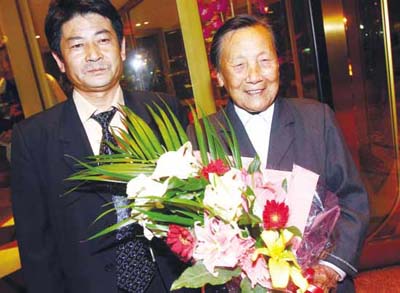Nanking Massacre survivor Xia Shuqin told what she saw and felt in Japan after she won a libel case against right-wing Japanese author Shudo Higashinakano there last week.
Xia Shuqin (R) returns to Nanjing, Jiangsu Province, after she scored the victory at Japan's Tokyo District Court, November 4, 2007.
Japan's Tokyo District Court ruled on November 2 that a Japanese author and his book publisher who produced a book about the Nanking Massacre must pay a total of 4 million yen (about US$34,800) as compensation to a Chinese survivor for calling her a fake.
Presiding judge Michiyo Miyokawa ruled that the book damaged Xia Shuqin's (the woman in question) reputation by giving readers the impression that she was not a victim of the Massacre while she actually is.
After her victory, Xia returned to Nanjing, known as Nanking when the massacre was carried out during the WWII, on the evening of November 4. She told the Nanjing Morning Post (NMP) that she wanted the truth to be told more than she wanted financial compensation.
NMP: Are you satisfied with the Tokyo court's verdict?
Xia: I'm very happy, very satisfied! I won. When I realized that the book had been published in 2000, I felt great stress. Those Japanese people said that I was a fake witness, a puppet created by government; I just couldn't stand it. I have lost seven family members in that massacre, I'm their witness and I have the right and responsibility to tell the truth. My victory is also a victory for other Nanking Massacre survivors! Next month is the 70th anniversary of the massacre; I will go to my family's graves and say to them: "I won against the Japanese liars! You can rest in peace."
NMP: Before you went to Japan, you said that your biggest wish was to meet face to face with the book's author, Shudo Higashinakano. But you didn't.
Xia: No, I didn't. This time, while I was in Japan, I always wanted to meet him. I told the media to ask him to come. But he didn't. He was afraid. He knew that he was a liar. I have nothing to fear, even though he defamed me, but he has everything to fear.
NMP: According to Japanese media, he is going to appeal. You case may go back to court again and again. Do you have any comment on this?
Xia: After I won, he said that he would appeal. But I'm not afraid. Wherever he sues and appeals, I will win. If my old body allows me, I will go to Japan again and tell the Japanese people that I was truly the Nanjing girl who survived in a pile of dead bodies.
NMP: I heard that you made a speech in Japan. What do Japanese people think about your case?
Xia: I have got much help from the Japanese people. I told my family's stories and the history that I witnessed, even though I've already told it so many times, and every time I told these stories, I would cry. Many young Japanese also cried. I told them that what I hated was Japanese soldiers at that time and the present right-wingers, but I also said that most Japanese people are nice and friendly. I hope China and Japan's young people can get along with each other and never allow an atrocity like the Nanking Massacre to happen again.
NMP: The Tokyo court only ruled 4 million yen in compensation for you, that's a lot less than the 12 million yen that you sued for. How do you feel about this ruling?
Xia: The amount of money is not important. The most important thing is that the Japanese people remember this historical tragedy. Although the money is not as much as I demanded, the verdict again verifies the defamation that Shudo Higashinakano did to me. It's a huge blow to Japanese right-wingers, who have constantly denied the true history. This means much more than money.
Cases review
The book, The Nanking Massacre: Fact versus Fiction -- A Historian's Quest for Truth written by Asia University professor and right-wing writer Shudo Higashinakano and published by Tendensha in 1998, has been translated into English and Chinese. About 13,000 copies of the book have been sold in Japan.
Xia Shuqin filed a defamation suit in a Nanjing local court in 2000 and eventually won in August 23, 2006. The court ruled that the two Japanese must pay 1.6 million yuan (US$200,000) in compensation and tender a public apology.
Higashinakano sued Xia in a Tokyo district court in April 2005, demanding that she acknowledge that her suit filed in Nanjing had no basis. But Higashinakano's lawyer dropped the case the day it was to be heard when Xia went to Tokyo in June to defend herself.
Xia, who lost seven family members during an attack by the Imperial Japanese Army in 1937, counter-sued Shudo Higashinakano and the Tokyo-based publisher Tendensha in May 2006.
The 79-year-old survivor is an important figure in John Magee's 105-minute documentary film about the massacre and the wartime diaries of John Rabe. Magee, an Episcopal pastor, and Rabe, a Hamburg businessman, were among the 22 westerners in charge of the Nanking International Safety Zone created after the Japanese army captured Nanjing.
Xia's lawyer Tan Zhen said that the case is not just a personal lawsuit. It is a battle between two historical perspectives. Only if the true story is told and accepted will the correct historical perspective be established. Then China and Japan would have a long-term, peaceful and friendly relationship. And this kind of tragedy will never occur again.
(China.org.cn by Zhang Rui November 7, 2007)


